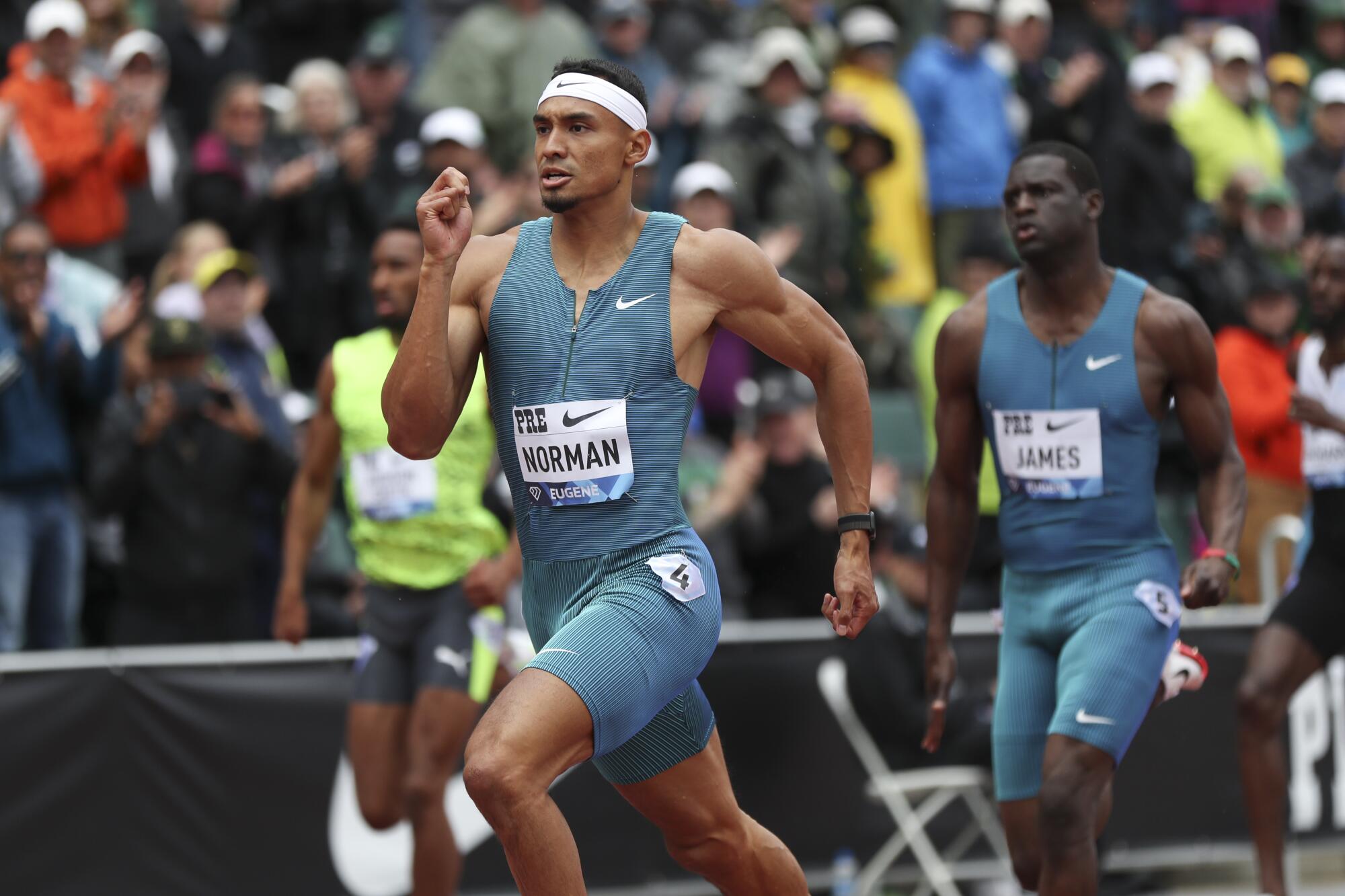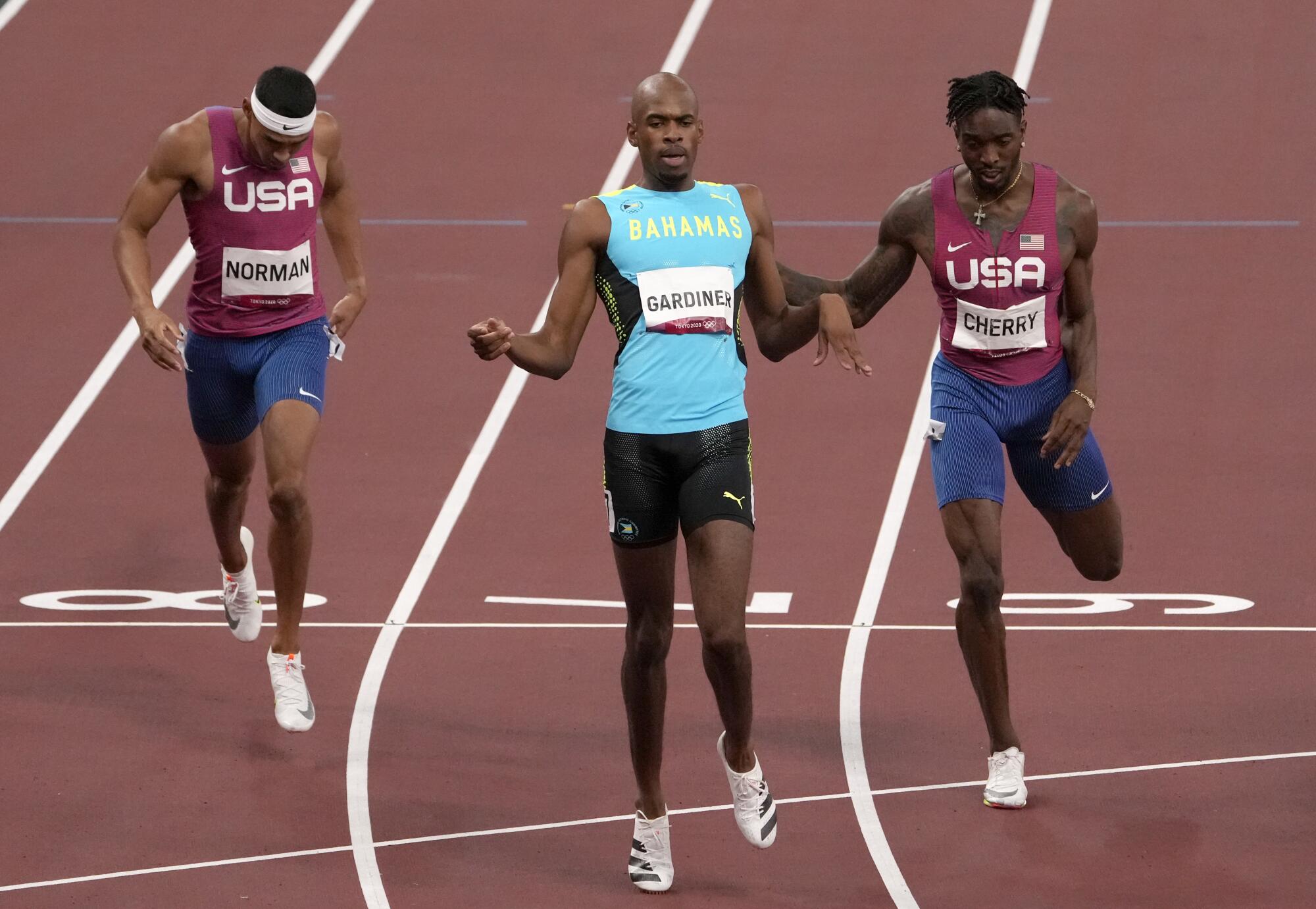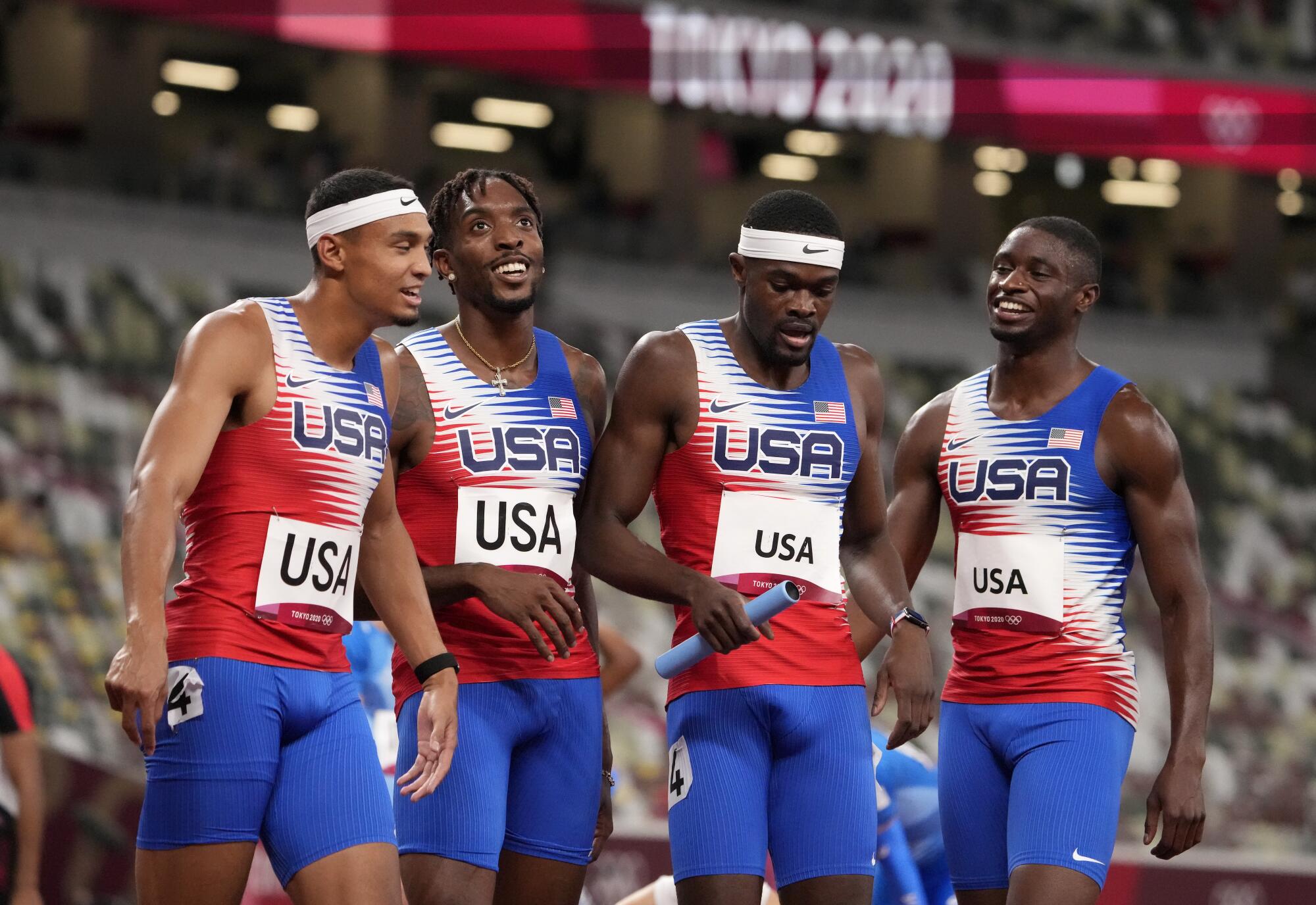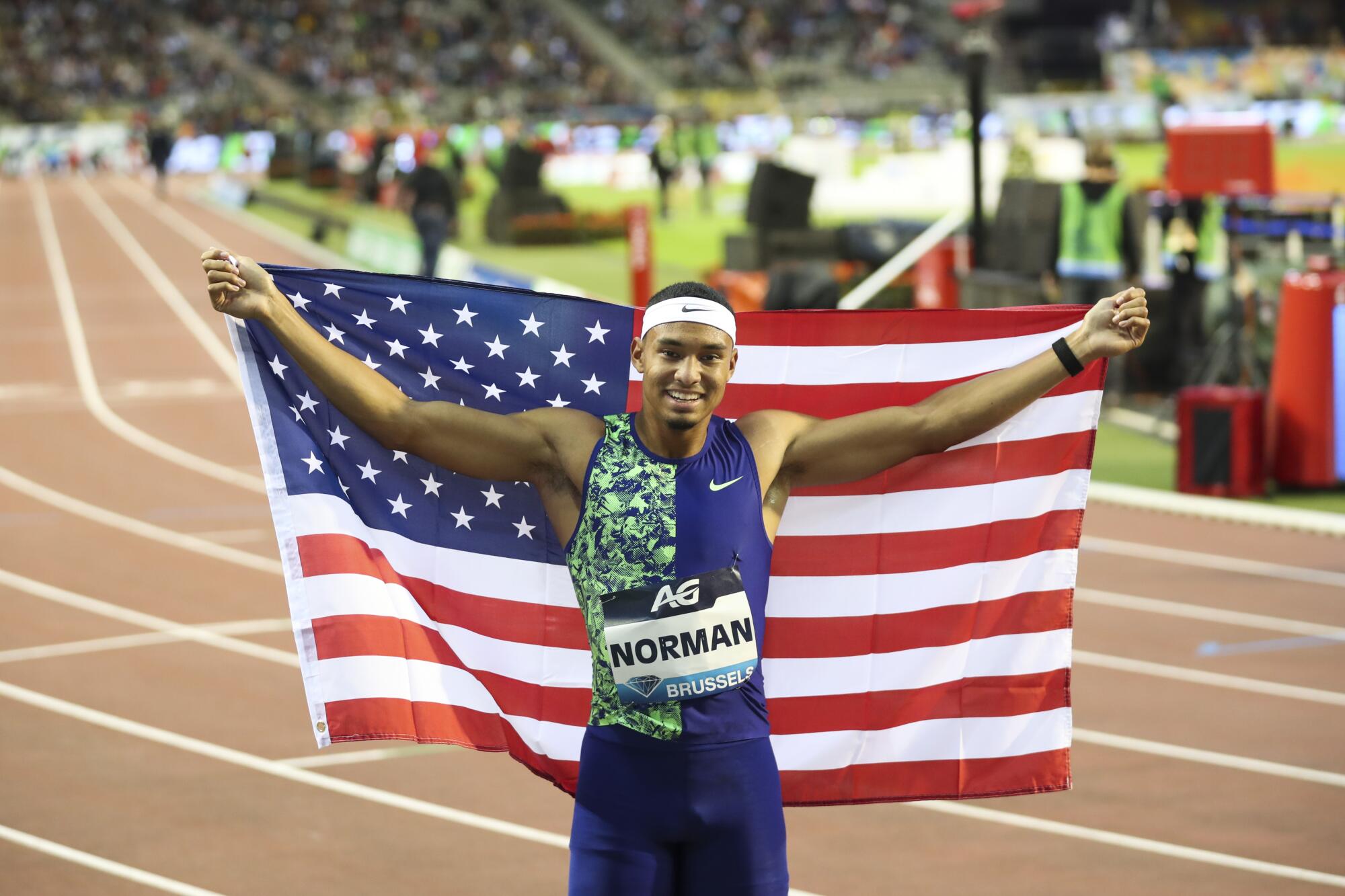
- Share via
Michael Norman’s counters are covered by empty water bottles that track his daily intake.
His journal is filled with logs of carbohydrates and proteins eaten, power cleans and squats lifted, and reps completed.
His mind is the definition of one-track. A self-described foodie, car lover and thrill-seeker who once rode a Jet Ski from Long Beach to Catalina and back, Norman is also the same person who paused recently when asked how he takes his mind off his work, then says he’s still trying to figure that part out.
In 2013, as only a freshman at Vista Murrieta High, Norman stunned his parents by sharing his goal to sprint in the Olympics — just three years later. He didn’t make those Games. Yet his father, Michael, recalled the vow as a hinge moment in his son’s life, when he became dedicated to an all-consuming search for the information and improvement Norman, now 24, believes will make him one of the fastest humans to ever cover 400 meters and stand atop top of track and field’s most significant podiums.
It is why, in the months leading up to next week’s U.S. championships in Eugene, Ore., and a potential return trip there in July for the world outdoor track and field championships, 2021 has remained so baffling for Norman.
The runner who craves answers can pinpoint few to explain why last season went so wrong.
Amid a Tokyo Olympics when U.S. men’s sprinters uncharacteristically struggled to medal, Norman was one of the biggest mysteries. The U.S. 400-meter champion and a favorite in Tokyo, he faded to fifth in 44.31 seconds, nine-tenths of a second slower than his personal best. He said his struggles started long before he began that race in an unfamiliar lane, eight, and finished in an unfamiliar style, as if pulling an invisible weight over the final 150 meters.
“The hardest moment of Tokyo for myself was probably the first two or three hours after the race,” Norman said. “I just remember sitting in drug testing and I was just defeated. It was heartbreaking, [a] devastating moment for myself.
“I can’t exactly tell you what went wrong last year. I start my first day of practice and I’m just struggling from Day 1. I don’t know why. My mind wants me to work out extremely hard and elevate at practice but my body just wasn’t responding or working. I felt like I had a disconnect, like I wasn’t in my body. It was like the weirdest feeling all year.”
With Norman’s mother, Nobue Saito Norman, traveling to her native Japan to watch the Olympics, his father watched on television from Florida at a party organized by one of Norman’s sponsors. They don’t talk much on race days, the exception a text message or two reminding Norman to have fun, so his father didn’t know exactly how his son felt before the Olympic final. He understood all the same when he didn’t see what he called his son’s two most recognizable traits, his speed or his smile.

“He’s not afraid of any situation,” the father said, “but when he got to Tokyo last year, I knew that he wasn’t himself. He doesn’t even sound like himself because he’s usually laughing. He was super serious and you knew he didn’t have it. But I will give it to him, he put it all out on the line.”
The day after his fifth-place finish, Norman met with his coach, Quincy Watts, the former 400-meter standout and USC coach, who told him not to let the disappointment linger with the 1,600-meter relay still offering a chance for gold. When Norman closed powerfully by passing two leaders over the last 150 meters, his 44-second second leg provided a sizable lead and eventual gold for the U.S. — yet for Norman, it was little consolation.
“A great moment for ourselves,” Norman said, “but it was like, mixed emotion for myself. It’s like, I got a gold medal but also failed at the same time. How do I really feel right now?”
His parents reminded Norman that he’d entered a small club of gold medalists. His father hopes his appreciation for the accomplishment will grow with time.
“He calls that gold medal a ‘participation medal,’” his father added. “He had his mind set on not silver, not bronze, but he had his mind set on [400-meter] gold and when he didn’t achieve it, he was really devastated.”
Norman’s eight months since returning from Tokyo have been filled with “every emotion,” he said in May, ranging from disappointment, frustration and envy. And lately, something else: the return of his smile and speed.
In late May, two months before the world championships will be held on U.S. soil for the first time, a meet equal in quality to an Olympics, Norman won the Prefontaine Classic in 43.60, wiping out one of the year’s best fields on a wet track in his fastest time since his personal best of 43.45 in 2019. Former Olympic gold medalist Michael Johnson, whose meet record Norman usurped, praised Norman’s “masterclass” race on Twitter.
“This is the first race this year where I felt like the hard work and discipline and consistency that I’ve been working on this year is finally paying off,” Norman said.
It was the return of a rhythm Norman knows well despite his youth, the pattern of setback-comeback that has defined his career.
Only weeks after graduating high school in 2016 as the national record-holder at 400 meters, Norman defeated three-time Olympian Justin Gatlin in the 200 at the Olympic track and field trials. His encore went against expectations — a fourth-place finish at the NCAA championships to cap a freshman season at USC that he said was held back by injuries and the transition to college.

The next year, he broke the collegiate 400 record and was named track and field’s top men’s college athlete. In 2019, his first year as a professional, he failed to qualify for the world championship 400-meter final while nursing a hamstring injury. He began 2020 training like “I thought I was on fire.” Then a pandemic wiped out the season.
What makes this version of a comeback different, he said, was that in the past he had a clear answer for what had gone wrong, but last year didn’t offer such clarity.
“Something didn’t click,” said Dunford Rodill, an athletic trainer who has worked with Norman since 2016. “And I think it was a mystery to everybody.”
Norman didn’t run a 400 in 2020 and said he’d lost some of his “feel” for the distance last year. Norman’s father said his son moved twice last year, missed some practice time because of a close COVID contact and a minor injury, but acknowledged an ineffable sense something was off after watching his very first race of 2021. Norman’s U.S. title sparked celebration; the winning time, less so.
At the Olympics, there was “a lot of stuff mentally too; a lot of pressure,” his father said. He had a made-for-primetime backstory that seemed ready to launch him into mainstream exposure with a win. Norman’s mother was one of Japan’s top teenage sprinters when growing up southwest of Tokyo.
Without a clear sense of what needed to be fixed, Norman and Watts opted for a “back to basics” strategy for training, Rodill said. Norman said he has become even more diligent. He adds to a list of Los Angeles restaurants he wants to try. He harbors a desire to sky dive for the first time. But both interests, he knows, must wait until after his season ends.
“He’s committed to doing the things that are in his control to accomplish his goals,” Rodill said. “Commitment, that’s the biggest thing.”

Said Norman’s father: “Within the first month of fall practice he said, ‘I feel better than I felt all year last year.’ And it’s starting to show.”
Where completing 10 pull-ups was a challenge for Norman last year, this year he said he is regularly completing sets of 15 with additional weight attached. In another key indicator of his strength, the back squat, he has improved his repetition max by 50 pounds.
By early June, Norman remained the only man in the world to break 44 seconds this season, putting him squarely among the favorites to claim the individual gold on an outdoor world championship or Olympic stage that has eluded him. After his praise of Norman’s Prefontaine Classic performance, Johnson later wrote that he and 100-meter winner Trayvon Bromell were impressive but “have yet to produce winning performances at championships. Another opportunity to change that this Summer.”
Norman bristles at any mention of Johnson, saying he cares only to hear the thoughts of Watts.
“I will forever remember the feelings and emotions I went through at the Olympics and after the Olympics, even during fall training the year after that, until I get another shot, another opportunity,” Norman said.
At the Prefontaine Classic, when a representative from the upcoming Paris Summer Olympics handed Norman letterhead, a marker and a request to write a message to his 2024 self, he scribbled quickly where other athletes had paused, saying he knew just what to write. He smiled as he posed with the paper, whose first line he underscored three times.
Remember 202one. Have fun too.
More to Read
Go beyond the scoreboard
Get the latest on L.A.'s teams in the daily Sports Report newsletter.
You may occasionally receive promotional content from the Los Angeles Times.







